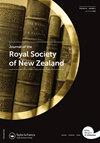Growing a community’s sense of ‘heritage’: a former mataī forest from SW Ōtautahi Christchurch and its nitrogen status, 860–1430 CE
IF 2.1
4区 综合性期刊
Q2 MULTIDISCIPLINARY SCIENCES
引用次数: 0
Abstract
ABSTRACTAs in many places, heritage narratives in Ōtautahi Christchurch remain focused on colonial times. To expand these narratives, we examined three subfossil mataī (Prumnopitys taxifolia) excavated along a 700 m arc during residential subdivision earthworks. Characterisation used δ15N, radiocarbon, and ring width measurements. Conventional (uncalibrated) radiocarbon ages were 1222 BP (calibrated median 856 CE), 932 BP (1148 CE) and 545 BP (1425 CE). Mean δ15N values of +1.0 ± 1.1‰ (±SD) were similar to nearby alluvial forest remnants, with no discernible change through the 550-year sampling interval. Ring widths in three trees from the 545 BP site were 0.58 ± 0.12 mm, half that of present day mataī from humid West Coast forests at a similar latitude. The 545 BP site included a burnt stump, and stumps with longhorn beetle (Cerambycidae) larval galleries that occur only in already dead trees. We conclude that the forest was slow growing and mesotrophic but dynamic due to periodic flooding, ending with fire around 1430 CE and inundation of the dead standing forest years or decades later. We are now using traditional and social media and artists to disseminate the narrative of a former mataī forest ‘beneath our feet’ through schools, community groups, and in public facilities.KEYWORDS: Cerambycidaecommunity engaged researchhuman impactNew ZealandpodocarpPrumnopitys taxifoliaSamalasstable isotope AcknowledgementsJo Golden (Christchurch City Council) facilitated retrieval of the material that underpinned our work, and carver John Robertson found the fire-damaged stump. Sarah Bury, Julie Brown, and Josette Delgado carried out stable isotope sample preparation and analysis. We are indebted to the university academics who gave their expertise and moral support to the project. Peter Almond (Lincoln University) advised us on the sedimentary history of our study site, and he and Matiu Prebble (University of Canterbury) shared information about their project on another subfossil wood discovery nearby. Rod Wallace (University of Auckland) identified the 932 BP and 1222 BP wood samples. John Marris (Lincoln University) identified potential sources of the larval cavities in the 545 BP disc, discussed potential sources of the radial cavities in the >5.4 m stem with his entomologist network, and provided relevant literature. Richard Holdaway (University of Canterbury) linked the 1256 CE ring width hiatus to the Samalas LVE. Finally, we acknowledge with thanks the substantial input from journal editors and three anonymous reviewers.Disclosure statementNo potential conflict of interest was reported by the author(s).Additional informationFundingFunding for the 932 BP and 1222 BP radiocarbon analyses came from Waipuna Halswell-Hornby-Riccarton Community Board via Discretionary Response Fund grant 61207 to Halswell Residents Association. Richard Holdaway included the 545 BP radiocarbon analysis in a project funded by the Brian Mason Science and Technical Trust (grant 2019/08).培养一个社区的“遗产”意识:来自SW的前mata森林Ōtautahi克赖斯特彻奇及其氮状态,860-1430 CE
与许多地方一样,Ōtautahi基督城的遗产叙事仍然聚焦于殖民时代。为了扩展这些叙述,我们研究了在住宅细分土方工程期间沿着700米弧形挖掘的三个亚化石mata (Prumnopitys taxifolia)。表征使用δ15N,放射性碳和环宽度测量。常规(未校准)放射性碳年龄分别为1222 BP(校准中位数856 CE)、932 BP (1148 CE)和545 BP (1425 CE)。+1.0±1.1‰(±SD)的平均δ15N值与附近的冲积森林遗迹相似,在550年的采样间隔内没有明显的变化。545 BP遗址的三棵树的年轮宽度为0.58±0.12 mm,是相似纬度的西海岸潮湿森林的一半。545 BP的遗址包括一个烧焦的树桩,树桩上有长角甲虫(天牛科)的幼虫洞,这种幼虫只出现在已经死亡的树木上。我们得出结论,森林生长缓慢,中营养化,但由于周期性的洪水,森林在1430年左右以火灾结束,并在数年或数十年后被淹没。我们现在利用传统媒体、社交媒体和艺术家,通过学校、社区团体和公共设施,传播“在我们脚下”的前mata森林的故事。关键词:天牛群落从事研究人类影响新西兰足类石竹石竹稳定同位素感谢乔·戈登(克赖斯特彻奇市议会)协助检索支撑我们工作的材料,雕刻者约翰·罗伯逊发现了被火烧毁的树桩。Sarah Bury、Julie Brown和Josette Delgado进行了稳定同位素样品的制备和分析。我们要感谢大学的学者们,他们为这个项目提供了专业知识和道义上的支持。林肯大学的彼得·阿尔蒙德(Peter Almond)对我们研究地点的沉积历史提出了建议,他和坎特伯雷大学的马蒂乌·普雷布尔(Matiu Prebble)分享了他们在附近发现的另一个亚化石木材的项目信息。Rod Wallace(奥克兰大学)鉴定了932 BP和1222 BP的木材样本。John Marris (Lincoln University)确定了545 BP盘中幼虫空洞的潜在来源,并通过其昆虫学家网络讨论了>5.4 m茎中径向空洞的潜在来源,并提供了相关文献。坎特伯雷大学的理查德·霍德威(Richard Holdaway)将1256 CE环宽度的间隙与萨玛拉斯LVE联系起来。最后,我们感谢期刊编辑和三位匿名审稿人的大量投入。披露声明作者未报告潜在的利益冲突。额外信息资金用于932bp和1222bp放射性碳分析的资金来自Waipuna Halswell- hornby - riccarton社区委员会,通过酌情反应基金61207号拨款给Halswell居民协会。Richard Holdaway将545 BP放射性碳分析纳入布赖恩梅森科学和技术信托基金资助的项目(赠款2019/08)。
本文章由计算机程序翻译,如有差异,请以英文原文为准。
求助全文
约1分钟内获得全文
求助全文
来源期刊

Journal of the Royal Society of New Zealand
综合性期刊-综合性期刊
CiteScore
4.60
自引率
0.00%
发文量
74
审稿时长
3 months
期刊介绍:
Aims: The Journal of the Royal Society of New Zealand reflects the role of Royal Society Te Aparangi in fostering research and debate across natural sciences, social sciences, and the humanities in New Zealand/Aotearoa and the surrounding Pacific. Research published in Journal of the Royal Society of New Zealand advances scientific knowledge, informs government policy, public awareness and broader society, and is read by researchers worldwide.
 求助内容:
求助内容: 应助结果提醒方式:
应助结果提醒方式:


